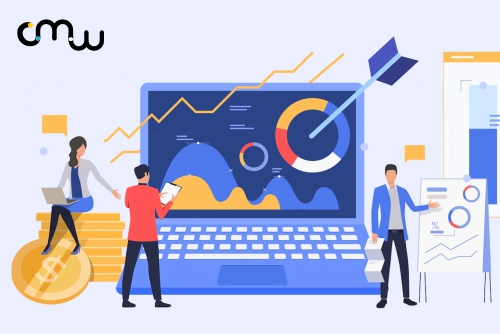Introduction:
Data-driven marketing strategies have become increasingly important in today's digital world. By leveraging data to optimize the customer experience, businesses can increase their return on investment and maximize profits. Let's look at some of the different ways you can use data to inform your marketing strategies and get the most out of your marketing budget.
What is Data-Driven Marketing?
Data-driven marketing is a term that refers to the use of data to inform marketing efforts. It's a systematic approach that relies on data collected from customers, prospects, and market research to make informed decisions about how to reach best and engage target audiences.
The goal of data-driven marketing is to improve the effectiveness of marketing campaigns and ultimately drive more revenue. To do this, marketers need to collect and analyze data at every stage of the customer journey, from awareness to purchase.
There are a number of different ways to collect data for data-driven marketing, including surveys, interviews, focus groups, website analytics, social media listening, and more. Once marketers have collected this data, they can use it to inform their decision-making around topics like campaign planning, messaging, creative direction, target audience selection, and media mix. When done well, data-driven marketing can be an extremely effective way to improve the ROI of marketing campaigns. By using data to inform decisions, marketers can ensure that their campaigns are better targeted and more likely to drive results.
The Benefits of a Data-Driven Approach
Data-driven marketing is a term that refers to the use of data to inform marketing decisions. It's a hot topic in the marketing world because it allows marketers to be more strategic and efficient with their time and resources.
There are many benefits of using a data-driven approach to marketing, including:
Increased Efficiency: When you have data informing your decisions, you can work more efficiently because you know what works and what doesn't. This can save you time and money in the long run.
Improved Decision Making: Data allows you to make better decisions about where to allocate your resources. With data, you can identify which strategies are working and which aren't, so you can focus on the ones that are yielding the best results.
Greater ROI: A data-driven approach often leads to increased ROI because it allows you to be more effective with your marketing spend. By targeting your efforts on the channels that are most effective, you can get more bang for your buck.
Better Insights: Data provides insights into customers' behavior, which can be used to improve the customer experience. When you understand how customers interact with your brand, you can make changes that lead to improved satisfaction and loyalty.
Increased Customer Lifetime Value: Because data-driven marketing leads to improved customer experiences, it often leads to increased customer lifetime value. satisfied customers are more likely than unsatisfied customers to continue.
Gathering the Right Data for Your Business
Data-driven marketing is all about leveraging customer data to inform your marketing decisions. But in order to make data-driven marketing work for your business, you need to have the right data.
The first step is identifying the kind of data that will be most useful for your business. This will vary depending on your industry, product, and objectives. Once you know what kind of data you need, you can start collecting it. There are a few different ways to collect customer data. You can purchase it from a third-party provider, collect it yourself through surveys and research, or compile it from public sources. Once you have the data you need, it's time to start using it to inform your marketing decisions. Data-driven marketing can help you improve your targeting, personalize your messages, and measure your results. By making use of the right data, you can maximize your ROI and take your marketing efforts to the next level.
Analyzing and Utilizing Your Data
As a business owner, you know that data is important. After all, it's what tells you whether your marketing efforts are paying off. But do you know how actually to analyze and utilize your data?
Data-driven marketing is all about using data to make decisions. That means collecting data, analyzing it, and then using it to inform your marketing strategy. The goal is to get more ROI from your marketing efforts by making smarter decisions based on data.
Here's how to get started with data-driven marketing:
- Collect data from multiple sources
- Clean and organize your data
- Analyze your data to identify trends and insights
- Use your insights to inform your marketing strategy
- Test and measure results to optimize your campaigns
Collecting data is easy most businesses already have a customer database or CRM system in place. The challenge comes in knowing how actually to use that data to drive results. That's where analysis comes in. You need to be able to understand what the numbers mean and how they can be used to improve your marketing efforts.
Strategies for Maximizing ROI with Data-Driven Marketing
Data-driven marketing is one of the most effective ways to improve ROI. By using data to drive your marketing decisions, you can make sure that you are allocating your resources in the most efficient way possible. Here are a few strategies for maximizing ROI with data-driven marketing:
Use data to segment your audience
One of the most important aspects of data-driven marketing is using data to segment your audience. By understanding who your target audience is and what they want, you can more effectively target your marketing efforts. This will result in higher conversion rates and more efficient use of your marketing budget.
Use data to personalize your messaging
Another important strategy for maximizing ROI with data-driven marketing is to use data to personalize your messaging. With so much noise online, it's important that your message stands out and speaks directly to the needs of your target audience. Personalized messaging will help you achieve this and will result in higher engagement rates and better ROI.
Use data to optimize your campaigns
Finally, another key strategy for maximizing ROI with data-driven marketing is to use data to optimize your campaigns. By constantly testing and refining your campaigns, you can ensure that they are as effective as possible. This will result in more leads and sales and, ultimately, a higher ROI for your business.
Implementing and Tracking Your Strategies
There are a few key steps to take in order to implement and track your data-driven marketing strategies successfully. First, you need to have a clear understanding of your target audience and what kind of data you have on them. This will help you determine which marketing channels and tactics you should use in order to reach them effectively.
Once you know who your target audience is and what type of data you have on them, you need to create a plan for how you're going to reach them. This plan should include which channels you're going to use (e.g., paid search, organic search, social media, email, etc.), what kind of messaging you'll use, and what call-to-action you want them to take.
After your plan is in place, it's time to start implementing it. This is where having detailed tracking setups comes in handy, so you can see which tactics are working and which ones aren't. Once you have this data, you can adjust your strategy accordingly and continue tweaking it until you're getting the results you want.
Conclusion
Data-driven marketing strategies are essential to any successful business looking to increase ROI and stay ahead of the competition. By leveraging effective data mining processes, businesses can gain insights into their target audiences, better understand customer behavior, determine trends that will help drive sales, and incorporate automation to streamline processes. With all this in mind, it's easy to see why data-driven marketing is so crucial for modern organizations. Make sure you leverage appropriate tools and resources if you want your efforts in this area to pay off!







